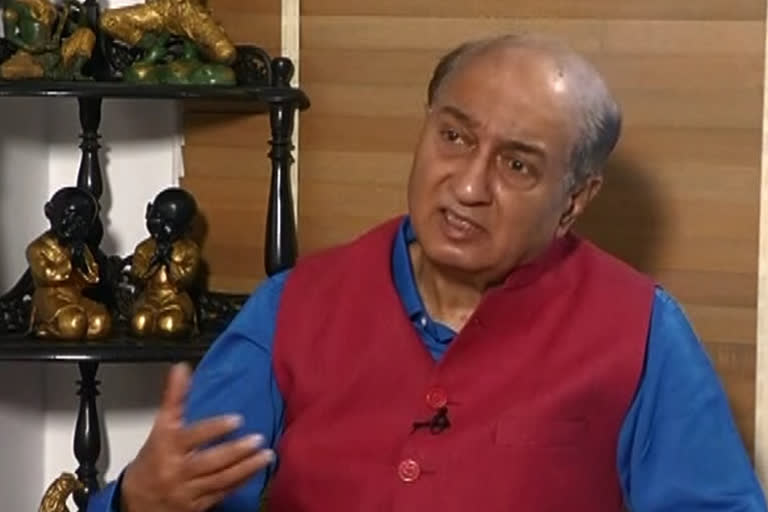New Delhi: Amid the dilemma as to whether India should vote for or against the UN draft resolution meant to hold Sri Lankan authorities accountable for human rights violation, India finally on Tuesday took a diplomatic approach and abstained from a crucial vote on the resolution at the ongoing 46th session of the UN Human Rights Council.
The island nation faced a critical resolution at the ongoing Human Rights Council in Geneva, on allegations of lack of justice and conciliation for the victims after the end of the armed conflict with the Tamil separatists Liberation Tiger of Tamil Elam (LTTE) in 2009.
Hailing India’s approach at the UNHRC, former diplomat G Parthasarathy said, “Sri Lanka's attitude towards India has been of understanding because they do by compulsion have good relations with China. It is not for us to determine what Lanka’s relation with China is but it should not have a bearing on India’s security or economic interest. And Sri Lanka has shown considerable sensitivity in ensuring that the offer made by India together with Japan in the Colombo port has been accepted. Sri Lankans are being careful about any naval facilities for China in the port in the east at the North. So I think taking into account our security concerns what India has done at the UNHRC today is correct”.
He underlines that Tamils in southern Sri Lanka have no problems and India is providing huge economic assistance and for those in Northern Sri Lanka, India has provided huge economic assistance after the conflict, particularly housing. “It is really for the Sri Lankans to settle their internal issues and India is encouraging dialogues between the Tamils and Sri Lankans. Therefore, in such circumstances, India’s abstention to vote is very much welcome because it serves our ‘national interest’, Parthasarathy reiterated.
READ: Tough call for India as Sri Lanka set to face resolution at 46th session of HRC: Expert
Representing India at the Human Rights Council on Tuesday, First Secretary at Permanent Mission of India at the United Nations, Pavan Badhe said, “India believes in the primary responsibility of states for the promotion and protection of human rights and constructive international dialogue and cooperation guided by the principles and purposes of the UN charter in support of such efforts”.
He said that India supports the call by the international community for the Government of Sri Lanka to fulfil its commitments on the devolution of political authority, including through the early holding of elections for Provincial councils and to ensure that all Provincial Councils can operate effectively, by the 13th amendment to the Sri Lankan constitution.
“At the same time, we believe that the work of OHCHR should conform with the mandate given by the relevant resolutions at the UN General Assembly”, Badhe added.
India further urged the Sri Lankan Government to carry forward the process of reconciliation, address the aspirations of the Tamil community and continue to engage constructively with the international community to ensure that the fundamental freedoms and human rights of all its citizens are fully protected.
READ: Indus water-sharing talks between India-Pak signals 'easing of tension'?
It, however, deserves a special mention that as an immediate neighbour, India has constituted to the relief, resettlement, rehabilitation and reconstruction process in Sri Lanka after the 2009 armed conflict.
A total of 11 countries voted against the resolution including China and Pakistan, 21 voted in favour, while 14 countries including India, Nepal abstained from voting today.
The resolution is based on a report by the United Nations Commissioner for Human Rights Michelle Bachelet who warned that Sri Lanka’s failure to address human rights violations and war crimes committed in the past puts the country on a dangerous path.
Ahead of voting on the UN resolution against Sri Lanka at the Human Rights Council, Gotabaya Rajapaksa led Sri Lankan government had earlier reached out to the international community seeking support at the UNHRC. More particularly, the Sri Lankan government had dialled Prime Minister Narendra Modi garnering support from India to vote against the UN draft resolution against Sri Lanka.
READ: Afghan Foreign Minister in Delhi to discuss peace process
However, India has time and again reiterated its consistent position on the question of human rights in Sri Lanka. India has always emphasized two fundamental pillars of support. One is India’s support to the Tamils of Sri Lanka for equality, justice, dignity and peace and the other is in ensuring the unity, stability and territorial integrity of Sri Lanka.
The UNHRC had passed several resolutions against Sri Lanka accusing it of violation of human rights, but the Sri Lankan government has always denied it and has seen such moves by the U.N as unwanted foreign interference.
Moreover, in 2020, Sri Lanka withdrew from an earlier Human Rights Council resolution.
It is worth noting that of the seven resolutions adopted by the UNHRC against Sri Lanka ever since the end of the conflict in 2009, only four was put to vote. India voted for three of those in 2009, 2012 and 2013, and abstained in 2014. The three resolutions adopted from 2015 were consensual and co-sponsored by Sri Lanka, which did not call for a vote.
READ: Analysis: India's role in Intra-Afghan talks central to Afghan’s economic future



